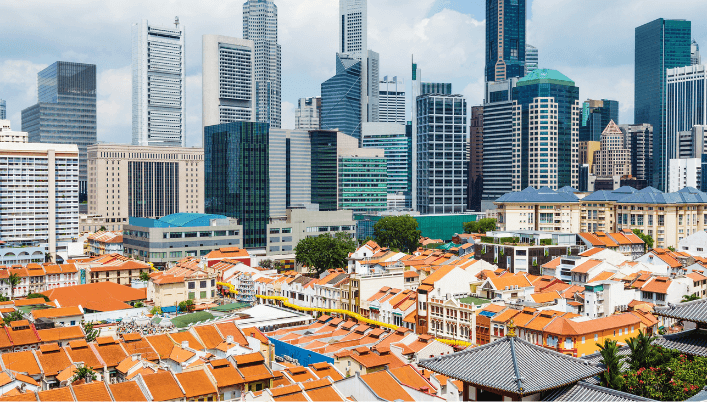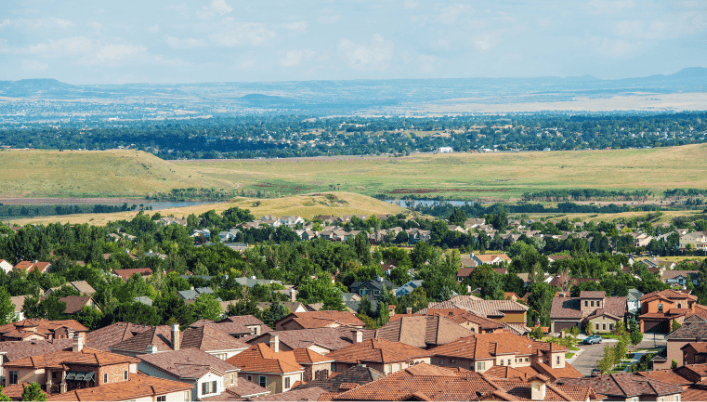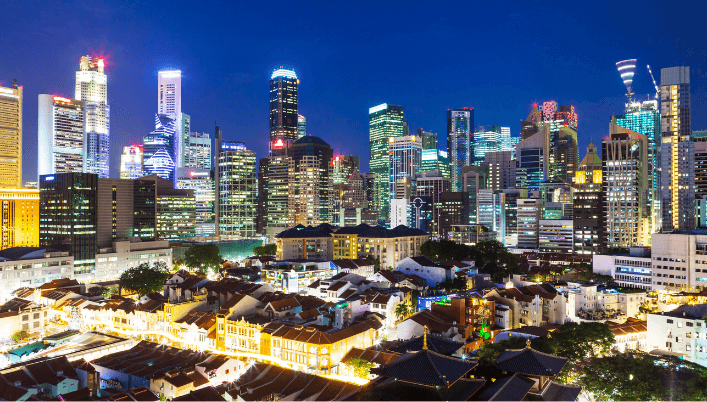
Discover the allure of renting landed property in vibrant Singapore, a realm of luxury, space, and prestige. Imagine indulging in the privacy of bungalows, semi-detached homes, or charming terrace houses.
Consider renting a room within these opulent residences, a blend of personal space and shared living but remember there are occupancy limits to maintain harmony.
The journey starts with a Letter of Intent, navigating legalities with ease, understanding lease agreements, and embracing the excitement of this unique living experience.
Experience the epitome of comfort and privilege, where every corner is an invitation to savor life’s delights by delving into the world of renting landed property in Singapore, you unlock a lifestyle as exceptional as the city itself.
Key Takeaways
- Advantages of Landed Property: Renting a landed property in Singapore offers benefits like increased space, privacy, and prestigious neighborhoods.
- Types of Landed Property: Choose from options like bungalows, semi-detached houses, terrace houses, and cluster houses. Consider your preferences and needs.
- Renting a Room: If budget-conscious or preferring shared living, renting a room in a landed property is an option. Enjoy benefits while sharing common spaces.
- Renting Process: To rent, submit a Letter of Intent (LOI) outlining your interest, proposed rental price, and lease duration to the landlord.
- Rental Costs: Costs vary based on location, size, and condition. Set a budget and consider maintenance fees and utilities.
- Occupancy Cap: Some areas have occupancy caps for landed properties. Comply with regulations before signing agreements.
- Furnished Options: Landed properties may be fully, partially, or unfurnished. Choose based on preferences and budget.
- Research Resources: Refer to reputable property websites and consult specialized real estate agents for more information.
- Unique Living Experience: Understand the process and explore options to find the perfect landed property that suits your needs and lifestyle.
- Rental Market: Demand and supply impact rental prices; they can fluctuate based on market conditions.
- Property Value: Property value directly influences rental costs. More valuable properties tend to have higher prices.
- Location: Different areas in Singapore have varying rental prices. Proximity to amenities can increase costs.
- Comparison of Rental Prices: Areas like Bukit Timah have higher rental prices due to prestige. City fringes, waterfront areas, and affordable locations are available options.
Overview of Renting Landed Property in Singapore
Renting a landed property in Singapore offers several advantages, such as more space, privacy, and the opportunity to live in prestigious neighborhoods.
Here’s what you need to know:
- Renting a Room: If you’re on a tighter budget or prefer a shared living arrangement, renting a room in a landed property is an option.
- This allows you to enjoy some of the benefits of living in a landed home while sharing common areas with other tenants.
- Types of Landed Property: Landed properties in Singapore include bungalows, semi-detached houses, terrace houses, and cluster houses.
- Each type offers different levels of privacy and space, so consider your preferences and needs before making a decision.
- The Process of Renting: To rent a landed property, you will need to submit a Letter of Intent (LOI) to the landlord.
- The LOI outlines your interest in renting the property and includes details such as the proposed rental price and lease duration.
- Rental Costs: The cost of renting a landed property in Singapore varies depending on factors such as location, size, and condition.
- It’s important to set a budget and consider additional expenses like maintenance fees and utilities.
- Occupancy Cap: It’s crucial to be aware that certain areas in Singapore have occupancy caps for landed properties.
- Ensure that you comply with these regulations before signing any rental agreements.
- Fully-Furnished Options: Some landed properties come fully furnished, while others are unfurnished or partially furnished.
- Consider your preferences and budget when choosing between these options
For more information on renting landed properties in Singapore, you can refer to related articles on reputable property websites or consult with a real estate agent who specializes in landed properties.
Renting a landed property in Singapore offers a unique living experience and the chance to enjoy the comforts of a private home.
By understanding the renting process and exploring your options, you can find the perfect landed property that suits your needs and lifestyle.
How Much Does It Cost to Rent a Landed Property in Singapore?

When it comes to renting a landed property in Singapore, the cost can vary depending on several factors.
Understanding these factors can help you make an informed decision and find the best deal for your budget.
Factors Affecting the Rental Cost of Landed Properties
The rental cost of landed properties in Singapore is influenced by various factors.
Here are some key considerations:
- Rental Market: The overall demand and supply of landed properties in Singapore can affect rental prices.
- Prices can fluctuate based on market conditions.
- Value of Your Property: The value of the property itself plays a significant role in determining the rental cost.
- More expensive properties will naturally have higher rental prices.
- Location: Different areas in Singapore have varying rental prices.
- Neighborhoods with amenities like schools, shopping centers, and proximity to the city center may be more expensive.
- For example, areas like Bukit Timah, Orchard Road, and District 10 are known for higher rental prices.
Comparison of Rental Prices in Different Areas of Singapore
To give you an idea of the rental prices in different areas of Singapore, here are some comparisons:
- Bukit Timah: Known for its prestigious residential properties, Bukit Timah has higher rental prices due to its prime location.
- City Fringes: Areas like Orchard Road and Grange Road in the city fringes are popular among expatriates and tend to have higher rental prices.
- Keppel Bay: This waterfront residential area offers luxurious landed properties with higher rental costs.
- Toa Payoh, Buona Vista, Tiong Bahru, Choa Chu Kang: These are more affordable areas with a range of landed properties available for rent.
It’s important to note that rental prices can vary within each area based on factors like property size, condition, and furnishings.
It’s advisable to work with a reputable real estate agent or do thorough research to find the best deal that suits your needs and budget.
By understanding the factors affecting rental costs and comparing prices in different areas, you can make an informed decision when renting a landed property in Singapore.
Related Articles and Resources

Useful Articles and Resources for Further Information on Renting Landed Properties in Singapore
If you’re considering renting a landed property in Singapore, there are several factors to consider.
Here are some useful articles and resources that can provide further information and guidance on the topic.
- Renting Landed Property in Singapore: A Complete Guide – This comprehensive guide covers everything you need to know about renting a landed property in Singapore.
- It includes information on the different types of landed properties, the rental process, legal considerations, and more.
- Renting Landed Property in Singapore: What You Need to Know – This article provides an overview of the rental market for landed properties in Singapore.
- It discusses factors such as rental costs, occupancy caps, and the types of landed properties available.
- Renting a Room in an HDB Flat: A Singaporean’s Guide – If you’re considering renting a room within an HDB flat, this guide is a helpful resource.
- It explains the process of renting a room, including the Letter of Intent (LOI) and other important considerations.
- Buying Landed Property in Singapore: What You Need to Know – If you’re interested in eventually buying a landed property in Singapore, this article provides valuable insights.
- It covers topics such as financing options, legal considerations, and the different types of landed properties available.
- What is an Executive Condominium (EC)? – Executive Condominiums (ECs) are a popular housing option in Singapore.
- This article explains what ECs are and provides information on eligibility criteria and the application process.
Remember to do thorough research and consult with real estate professionals before making any decisions.
Renting a landed property in Singapore can be a significant financial commitment, so it’s important to gather as much information as possible to make an informed choice.
Renting an HDB Flat Fully-Furnished vs. Renting a Landed Property

Comparison Between Renting an HDB Flat and Renting a Landed Property
When it comes to renting a place in Singapore, there are two main options to consider: an HDB flat or a landed property.
Each option has its own set of pros and cons, and it’s important to understand them before making a decision.
HDB Flat
Renting an HDB flat is the more affordable option for most Singaporeans.
The Housing and Development Board (HDB) offers subsidized housing for citizens, making it the cheapest option in terms of rental costs.
HDB flats are typically located in central estates or the city core, providing easy access to amenities and public transportation.
One of the advantages of renting an HDB flat is that it allows you to use your CPF savings to pay for the monthly rent.
This can help ease the financial burden, especially for first-time renters.
However, there are some limitations when it comes to renting an HDB flat, such as a minimum lease period and occupancy cap.
Landed Property
Renting a landed property, on the other hand, offers more space and privacy compared to an HDB flat.
Landed properties include terraced houses, semi-detached houses, and bungalows.
These properties are usually fully-furnished and come with amenities like swimming pools or gardens.
While renting a landed property provides a higher level of luxury and comfort, it also comes with a higher price tag.
The rental costs for landed properties are significantly higher than those for HDB flats.
Additionally, tenants will need to pay a security deposit and may face challenges when it comes to lease renewal due to the limited supply of landed properties.
Tips for Effective Time Management

Title 1: Prioritize Tasks
One of the key aspects of effective time management is prioritizing tasks.
By identifying and focusing on the most important and urgent tasks, you can make better use of your time.
Start by creating a to-do list and categorize tasks based on their importance and deadlines.
This will help you stay organized and ensure that you are working on the most crucial tasks first.
Title 2: Set Realistic Goals
Setting realistic goals is essential for effective time management.
Break down larger goals into smaller, manageable tasks that can be accomplished within a specific timeframe.
This will prevent you from feeling overwhelmed and help you stay motivated as you achieve each milestone.
Remember to set deadlines for each task to maintain accountability.
Title 3: Avoid Procrastination
Procrastination is a common time management challenge that can hinder productivity.
Combat this by practicing self-discipline and adopting strategies to overcome procrastination.
One effective technique is the Pomodoro Technique, which involves working for a set period, such as 25 minutes, followed by a short break.
This method helps maintain focus and prevents distractions.
Title 4: Delegate and Outsource
Recognize that you cannot do everything on your own.
Learn to delegate tasks to others who are capable of handling them efficiently.
This frees up your time to focus on more critical responsibilities.
Additionally, consider outsourcing certain tasks or projects to professionals or freelancers who specialize in those areas.
This allows you to leverage their expertise while saving time and effort.
Title 5: Avoid Multitasking
Contrary to popular belief, multitasking does not improve productivity.
In fact, it can lead to decreased efficiency and errors.
Instead, practice single-tasking by focusing on one task at a time.
This allows you to give your full attention and produce higher-quality work in less time.
Title 6: Take Breaks and Rest
Taking regular breaks and ensuring sufficient rest is vital for maintaining productivity.
Schedule short breaks throughout the day to recharge and avoid burnout.
Additionally, prioritize getting enough sleep each night to ensure optimal cognitive function and energy levels.
Remember, effective time management is a skill that can be developed with practice and consistency.
By implementing these tips, you can enhance your productivity, reduce stress, and achieve a better work-life balance.
Buying Landed Property in Singapore

Overview of the Process and Considerations for Buying a Landed Property in Singapore
Singapore is a vibrant city with a diverse real estate market.
For those looking to invest in landed property, it’s important to understand the process and considerations involved.
When buying a landed property in Singapore, there are several key factors to consider.
First, you need to understand the different types of landed property available, such as bungalows, semi-detached houses, and terrace houses.
Each type has its own unique features and price range.
The process of buying a landed property starts with finding the right property that fits your budget and preferences.
Once you’ve identified a property, you’ll need to make an offer by submitting a Letter of Intent (LOI) to the property owner.
The LOI outlines your proposed purchase price and other terms and conditions.
After the LOI is accepted, you’ll need to engage a lawyer to handle the legal aspects of the transaction.
This includes conducting due diligence on the property, verifying the land title, and preparing the necessary legal documents.
To complete the purchase, you’ll need to pay the purchase price.
This can be done through bank transfer or by issuing a cheque.
It’s important to note that there are additional costs involved in buying a landed property, such as stamp duty and legal fees.
Permanent Resident’s Eligibility for Buying Landed Property
Singapore Permanent Residents (SPRs) have certain restrictions when it comes to buying landed property.
According to government regulations, SPRs are only allowed to purchase private residential properties, such as condominiums or apartments.
If you’re an SPR looking to rent a room in a landed property, you’ll need to ensure that the occupancy cap is not exceeded.
The occupancy cap refers to the maximum number of unrelated individuals allowed to live in a landed property.
Before making any decisions, it’s advisable to consult with a real estate agent or lawyer who specializes in landed property transactions.
They can provide guidance on the eligibility criteria and help you navigate the buying process.
In conclusion, buying a landed property in Singapore requires careful consideration and understanding of the process.
By doing thorough research and seeking professional advice, you can make an informed decision that suits your needs and budget.
Understanding Different Types of Landed Property in Singapore
Explanation of the Various Types of Landed Properties Available for Rent in Singapore
When it comes to renting landed property in Singapore, there are several options available.
Understanding the different types can help you make an informed decision that suits your needs and preferences.
- Terrace House: These are typically narrow houses that are joined together in a row.
- They offer a balance between affordability and space, making them popular among families.
- Semi-Detached House: As the name suggests, these houses share a common wall with their neighbors on one side.
- They provide more privacy and space compared to terrace houses.
- Bungalow: Bungalows are standalone houses that offer the ultimate privacy and space.
- They are ideal for those who value exclusivity and luxury.
- Corner Terrace House: These houses are similar to terrace houses but are located at the end of a row, offering more land and space.
- They provide a sense of privacy and exclusivity.
- Private Apartments and Executive Condominiums (EC): While not technically landed properties, these types of housing offer similar benefits such as spacious living areas and access to facilities like swimming pools and gyms.
- Black-and-White Bungalows: These colonial-style houses feature white exteriors with black accents.
- They are known for their unique architecture and charm.
Differences Between Terrace Houses, Semi-Detached Houses, Bungalows, etc.
Each type of landed property in Singapore has its own unique characteristics and advantages.
Here are some key differences to consider:
- Terrace Houses: These properties are generally more affordable compared to semi-detached houses and bungalows.
- They offer a good balance between space and cost.
- Semi-Detached Houses: These houses provide more privacy compared to terrace houses as they share a common wall with only one neighbor.
- They also tend to have larger land areas.
- Bungalows: Bungalows offer the most privacy and space among the different types of landed properties.
- They are ideal for those who value exclusivity and luxury.
- Corner Terrace Houses: These houses provide additional land and space compared to regular terrace houses, offering a greater sense of privacy and exclusivity.
By understanding the different types of landed property available for rent in Singapore, you can make a more informed decision that suits your needs and preferences.
Whether you are looking for affordability, privacy, or luxury, there is a type of landed property that will meet your requirements.
Renting a Room in a Landed Property

Guidelines and Considerations for Renting a Room Within a Landed Property
If you are considering renting a room within a landed property in Singapore, there are several guidelines and considerations to keep in mind.
Firstly, it’s important to understand that renting a room in a landed property is subject to certain restrictions.
In Singapore, only six unrelated individuals are allowed to live together in a landed property.
This means that if you are looking to rent a room in a landed property, you will need to ensure that the other occupants are not already exceeding this occupancy cap.
When it comes to the types of landed properties available for rent, there are various options to choose from.
These include corner terrace houses, semi-detached houses, and bungalows.
Each type of property offers different features and amenities, so it’s important to consider your preferences and needs before making a decision.
Additionally, when renting a room within a landed property, it’s common for the property to be fully furnished.
This means that you can expect the room to come with basic furniture and appliances.
However, it’s always a good idea to clarify with the landlord or agent regarding the specific furnishings included in the rental.
In terms of rental transactions, it’s advisable to engage the services of a professional agent or property management company.
They can assist with the necessary paperwork, such as the Letter of Intent (LOI) and tenancy agreement.
These documents outline the terms and conditions of the rental, including the duration of the lease and rental amount.
Lastly, it’ worth noting that renting a room within a landed property is not limited to foreigners or expatriates.
Singaporeans also have the option to rent rooms within landed properties, provided they meet the occupancy cap and other requirements.
Legal Requirements and Obligations
When renting a room in a landed property, it’s important to be aware of the legal requirements and obligations.
The tenancy agreement is a legally binding document that outlines the terms and conditions of the rental.
It typically has a minimum lease term of one year, although shorter leases may be negotiated in some cases.
The tenancy agreement should include details such as the rental amount, payment terms, security deposit, and any additional fees or charges.
It’s important to review this document carefully before signing to ensure that you understand and agree to all the terms.
In addition to the tenancy agreement, both landlords and tenants have certain obligations under Singapore law.
Landlords are responsible for maintaining the property in a habitable condition and addressing any necessary repairs or maintenance.
Tenants, on the other hand, are expected to pay rent on time, keep the property clean and in good condition, and adhere to any rules or regulations set by the landlord.
By understanding these guidelines and legal requirements, you can make an informed decision when renting a room within a landed property in Singapore.
Whether you are a Singaporean looking for a comfortable living space or an expatriate seeking temporary accommodation, renting a room in a landed property can provide you with a unique and enjoyable living experience.
Conclusion
Renting a landed property in Singapore can be an exciting and rewarding experience.
It offers a sense of privacy, space, and the opportunity to live in desirable locations.
However, it is essential to consider various factors such as cost, location, and type of property before making a decision.
Summary of key points and final thoughts on renting landed properties in Singapore
- Private properties: Renting a landed property in Singapore falls under the category of private properties, which includes terrace houses, semi-detached houses, and bungalows.
- Cost: The cost of renting a landed property in Singapore varies depending on factors such as location, size, and condition.
- It is advisable to set a budget and explore different options within that range.
- Types of landed property: There are different types of landed properties available for rent in Singapore, including cluster houses, townhouses, and detached houses.
- Each type offers unique features and benefits.
- Lease terms: Most landlords prefer a one-year lease term for renting landed properties in Singapore.
- However, it is possible to negotiate for a longer lease term if desired.
- Location: Singapore offers a range of desirable locations for renting landed properties.
- Some popular areas include Tanglin, Holland Village, River Valley, and Pasir Ris.
- Fully-furnished options: Many landlords offer fully-furnished landed properties for rent, which can be convenient for tenants who prefer not to invest in furniture.
- Foreign individuals: Foreigners are allowed to rent landed properties in Singapore but are subject to certain restrictions such as an occupancy cap and approval from relevant authorities.
- Financial considerations: When renting a landed property in Singapore, it is crucial to consider your income and financial stability.
- Landlords may require proof of income or employment letters as part of the rental application process.
Renting a landed property in Singapore provides a unique living experience with various benefits.
However, it is essential to consider factors such as cost, location, and lease terms before making a decision.
By doing thorough research and understanding your needs, you can find the perfect landed property that suits your lifestyle and budget.
Frequently Asked Questions
What is the Renting Landed Guide?
The Renting Landed Guide is a comprehensive resource designed to provide information and guidance on renting landed properties in Singapore.
What is a condominium?
A condominium, often referred to as a condo, is a type of housing where individual units are privately owned, but common areas and facilities are shared among all residents.
What is an occupancy cap?
An occupancy cap refers to the maximum number of people allowed to reside in a particular unit.
It is important to check the occupancy cap before renting a property to ensure it meets your needs.
What does LOI stand for?
LOI stands for Letter of Intent.
It is a document that outlines the key terms and conditions of a rental agreement, indicating the tenant’s intention to lease the property.
Who can rent landed properties in Singapore?
Singaporeans and Permanent Residents (PRs) are eligible to rent landed properties in Singapore.
Foreigners may also be able to rent, but there are certain restrictions and requirements they need to fulfill.
What is Tanglin?
Tanglin is a residential neighborhood located in central Singapore.
It is known for its luxurious landed properties, including bungalows and semi-detached houses.
What is an EC?
EC stands for Executive Condominium.
It is a type of housing developed and sold by private developers but with certain eligibility conditions and restrictions imposed by the government.
What does fully furnished mean?
Fully furnished refers to a rental property that comes with all necessary furniture, appliances, and fixtures.
This means you don’t have to worry about buying or moving in your own furniture.
What are the different types of properties in Singapore?
In Singapore, you can find a variety of property types, including condominiums, landed houses, HDB flats, studio apartments, and more.
Each type has its own characteristics and eligibility criteria.
What is a faith deposit?
A faith deposit, also known as a good faith deposit, is a sum of money paid by the tenant to the landlord as a show of commitment to rent the property.
It is typically equivalent to one month’s rent.












